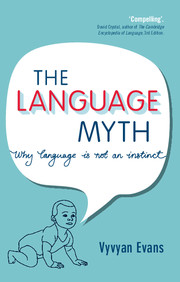Book contents
- Frontmatter
- Dedication
- Epigraph
- Contents
- Acknowledgements
- 1 Language and mind rethought
- 2 Is human language unrelated to animal communication systems?
- 3 Are there language universals?
- 4 Is language innate?
- 5 Is language a distinct module in the mind?
- 6 Is there a universal Mentalese?
- 7 Is thought independent of language?
- 8 Language and mind regained
- Notes
- References
- Index
3 - Are there language universals?
Published online by Cambridge University Press: 05 October 2014
- Frontmatter
- Dedication
- Epigraph
- Contents
- Acknowledgements
- 1 Language and mind rethought
- 2 Is human language unrelated to animal communication systems?
- 3 Are there language universals?
- 4 Is language innate?
- 5 Is language a distinct module in the mind?
- 6 Is there a universal Mentalese?
- 7 Is thought independent of language?
- 8 Language and mind regained
- Notes
- References
- Index
Summary
Myth: A Universal Grammar underpins all human languages; this specifies the various features that are shared by the world’s languages. On this basis it is possible to extract all the extant linguistic universals by studying a single language, for instance, English.
The language-as-instinct thesis claims that human babies enter the world pre-equipped to learn language. Language emerges effortlessly and automatically. And this is because we are all born with a Universal Grammar: a pre-specified listing of language universals – a universal being a feature of grammar that is shared by all human languages. Moreover, as all languages are assumed to derive from this Universal Grammar, the study of a single language can reveal its design. In essence, all languages, despite having different sound systems and vocabularies, are basically English-like.
But like the myth that language is unrelated to animal forms of communication, the myth of language universals is contradicted by the evidence. The myth of Universal Grammar was proposed by Chomsky as early as the 1950s, and formalised in the 1960s before the study of cross-linguistic diversity was well established. And so, one would have expected, once the facts had become known, the myth would have disappeared. But the thesis of Universal Grammar has proved difficult to eradicate. One reason is that the language-as-instinct thesis provides a complex and self-supporting worldview consisting of a number of sub-theses: all the elements providing inter-dependent planks, supporting the others regardless of the facts. Another is that advocates of this view have found it difficult to let go of the underlying rationalist impulse that underpins the entire system of beliefs: human language is unique, and its genetic endowment is bequeathed by nature. This view, in certain respects, is very appealing. In a single move, it explains the hard questions of language, and the mind.
- Type
- Chapter
- Information
- The Language MythWhy Language Is Not an Instinct, pp. 64 - 94Publisher: Cambridge University PressPrint publication year: 2014



